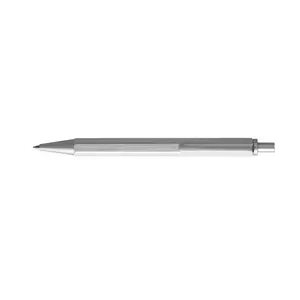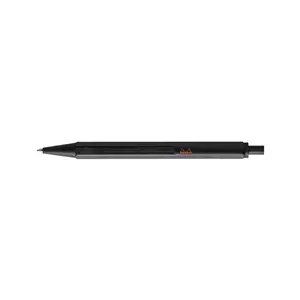RHODIA Ballpoint Pen
RHODIA
from € 28,00
to € 28,00
RHODIA
The stationery firm "Papeteries Vérilhac Frères" was founded in Lyon, France, in 1932 by two brothers, Henri and Robert Vérilhac.
They came from a family of paper merchants and their market extended from France across all of North Africa. At first they sold notebooks and stationery products, and then, in 1934, they started manufacturing and selling the Rhodia pads.
In 1997, Rhodia was bought by Clairefontaine. The production units were then grouped together near Mulhouse (Haut-Rhin, France) and the company Clairefontaine Rhodia was born.
…strong values
Irreproachable quality and finishes that are based on a long history of stationery expertise. Inventiveness and technical innovations (a perfectly waterproof and flexible card cover, a scored cover, "SANGRIF" head staples, a stiff back cover, micro-perforated, removable sheets).
A strong focus on aesthetics and a pioneering "orange & black" color scheme that plays on the obvious complementarity of these two colors to reflect dynamism and elegance.
All these high standards have forged the Rhodia pad’s "certificate of authenticity", creating a product that is both stylish and contemporary, whatever the epoch. For 85 years, this icon has been the matrix for the brand’s development.
The Rhodia Orange pad is instantly recognizable and has come to symbolize the quintessential notepad, the distillation of France’s finest stationery know-how. It serves as the matrix for the development of all the products that are designed and created today as the company adapts to the needs of today’s mobile, changing daily lifestyles.
Every year Rhodia is selling millions of made in France stapled pads in 90 countries worldwide!
The head stapled RHODIA pad
The Rhodia notepad was very avant-garde when it was created in 1934, and instantly overshadowed existing notepads because of the quality of its materials, its original and innovative design (a highly resistant scored front cover) and its unique, inimitable orange cover.
The product characteristics that have made its success for the last 85 years:
- Orange coated card cover: perfectly waterproof & flexible cover is scored to neatly fold back
- Superfine vellum RHODIA paper 80 g: white and exceptionally smooth satin finish - "Sangrif": staples do not appear on back
- Stiff back cover makes writing easy and portable
- Micro-perforated sheets for easy and clean removal - 2 or 4 holes punched sheets (limited to some models): to be accommodated in binders
- Stapled notepads as well as all other Rhodia products are made with PEFC certified paper.
Contrary to popular belief, the paper industry slots perfectly into protection of the environment. Therefore, to manufacture its high-quality papers, Clairefontaine mainly uses fibres from sawmill wastes or from pruned or thinned trees. It appears that the concept of deforestation is incorrect, only the outer wood is used to provide these fibres, the heart of the wood being intended for furniture and construction. Forest thinning promotes biodiversity, water management, and the health of trees. PEFC and FSC certifications furthermore, facilitates an even clearer surveillance, which helps with respecting the equilibrium between a forest and its wildlife, the preservation of outstanding tree specimens, planting varieties of species, and the preparation of soils, etc. Clearly Clairefontaine plays a role in protecting forests and, as an example, maintains hundreds of hectares of forest in the Vosges. Water management and conservation remain a major challenge, Clairefontaine has its own treatment plant, which has been recognised by the award of an official Trophy. Every year, its paper manufacturing consumes less energy, and lowers its emissions into the air. What's more, Clairefontaine adopts this responsible type of approach right up to its paper printing and stationery manufacturing activities, by exercising rigorous checks of the inks and glues used. The plant-based nature of the fibres makes their paper a fully recyclable material because it comes from a sustainable resource. Its use does not result in the removal of a finite stock of raw materials, as is the case with fossil fuels. Near Reims, Everbal, which is a subsidiary of Clairefontaine, only manufactures recycled papers. For Clairefontaine, the production of paper and stationery can genuinely be called “Green” industrial operation.


